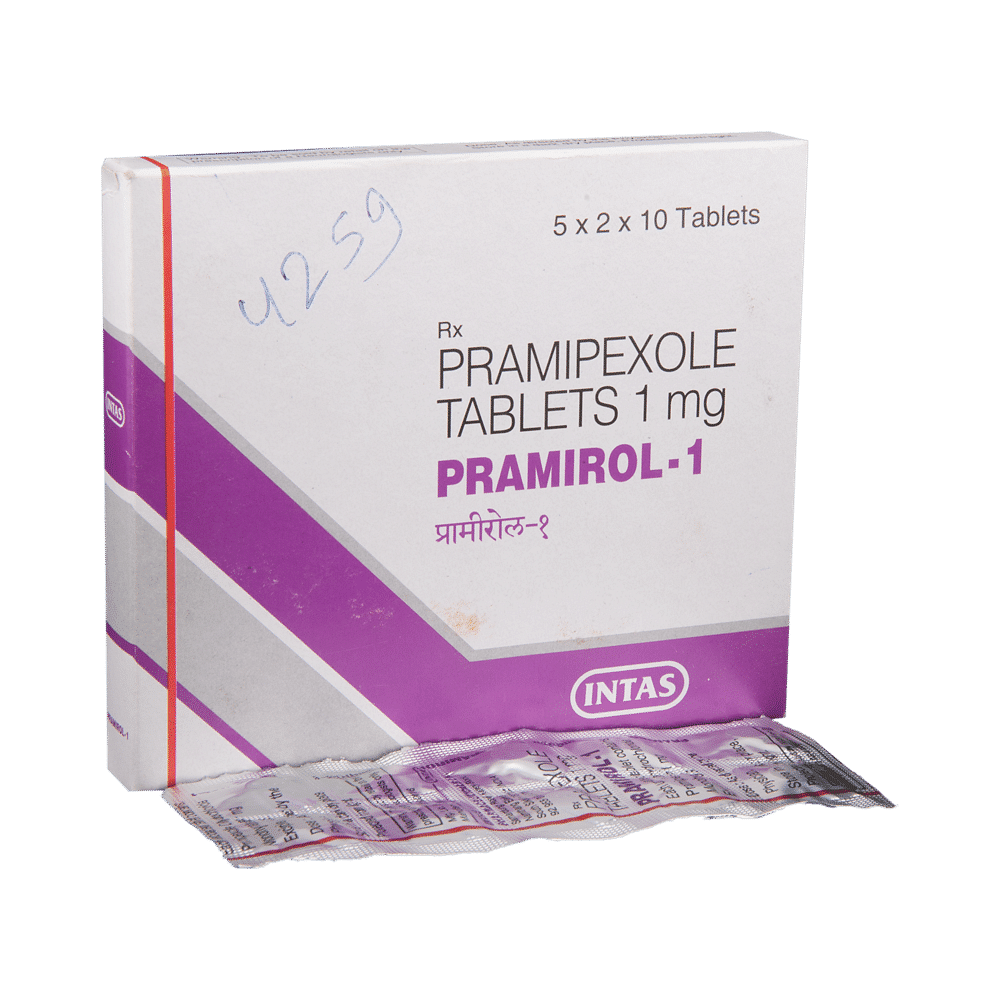
Pramiset 1mg Tablet
Manufacturer
MSN Laboratories
Salt Composition
Pramipexole (1mg)
Key Information
Short Description
Pramiset 1mg Tablet is used to treat Parkinson's disease and restless leg syndrome by slowing down body movements.
Dosage Form
Tablet
Introduction
Pramiset 1mg Tablet should be taken with food. It can be taken with or without food, but taking it with food may reduce nausea. Take it at the same time each day to maintain a consistent level of medicine in the body. Do not stop taking the medication suddenly without talking to your doctor. Some common side effects include nausea, dry mouth, fatigue, hallucinations, constipation, and peripheral edema.
Directions for Use
Take this medicine in the dose and duration as advised by your doctor. Swallow it as a whole. Do not chew, crush, or break it. Pramiset 1mg Tablet is to be taken with food.
How it works
Pramiset 1mg Tablet works by mimicking the action of dopamine, a chemical messenger that is needed to control movement in the brain.
Quick Tips
You have been prescribed Pramiset 1mg Tablet to treat your symptoms of Parkinson's disease and/or restless leg syndrome. Take it 2 to 3 hours before bedtime for restless leg syndrome. Avoid activities that require you to be alert such as driving a car until you know how this medication affects you. Rise slowly if you have been sitting or lying down to lower the chance of feeling dizzy or passing out. Do not stop taking the medication suddenly without talking to your doctor.
Related Medicines

Pramirol 1 Tablet

Pramipex 1 Tablet

Pexopram 1mg Tablet

Pexiol 1 Tablet

Pramirise 1mg Tablet

Remipex 1mg Tablet

Parpex 1mg Tablet

Mirator 1mg Tablet

Movexol 1mg Tablet
Frequently asked questions
Does Pramiset 1mg Tablet cause weight gain?
While some patients taking Pramiset 1mg Tablet may experience a decrease in body weight, which can be related to decreased appetite, rarely it may also result in an increase in weight. If you are concerned about your weight, please consult with your doctor or a nutritionist for guidance.
Does Pramiset 1mg Tablet make me sleepy?
Yes, Pramiset 1mg Tablet can cause drowsiness. Additionally, it may lead to sudden episodes of falling asleep, particularly when driving or operating machinery. In such cases, please refrain from these activities and notify your doctor immediately.
How does Pramiset 1mg Tablet work for restless legs?
Restless leg syndrome (RLS) is a condition characterized by discomfort in the legs accompanied by an intense urge to move them, primarily at night while sitting or lying down. Pramiset 1mg Tablet belongs to a class of medications called dopamine agonists. It stimulates dopamine receptors in the brain, which plays a role in controlling movement. This action leads to improved RLS symptoms.
Is Pramiset 1mg Tablet a muscle relaxant?
No, Pramiset 1mg Tablet is not a muscle relaxant and instead helps improve the control of movements in individuals with Parkinson's disease. It belongs to the dopamine agonist class and acts on dopamine receptors within the brain.
Can I stop taking Pramiset 1mg Tablet if my symptoms of Parkinson’s disease have improved?
Stopping Pramiset 1mg Tablet without consulting your doctor can be risky. Sudden discontinuation may lead to neuroleptic malignant syndrome, a serious condition characterized by muscle rigidity, fever, fluctuating blood pressure, rapid heart rate, confusion and difficulty in consciousness. Please follow your doctor's instructions for discontinuing the medication.
How should Pramiset 1mg Tablet be taken?
Take Pramiset 1mg Tablet as directed by your healthcare provider. Your doctor will determine your dose based on your specific condition and recommend the timing for administration. Ideally, it should be taken two to three hours before bedtime. Swallow the tablets whole with water. While taking Pramiset 1mg Tablet can be taken with or without food, taking it with food may help reduce nausea.
What are the serious side effects of Pramiset 1mg Tablet?
Serious side effects of Pramiset 1mg Tablet include hallucinations (seeing things or hearing voices that do not exist), confusion, aggressive behavior, agitation, abnormal thoughts, changes in vision, abnormal body movements like involuntary muscle twitches, and difficulty controlling bodily movement. If you experience any of these adverse events, it's crucial to contact your doctor immediately.
What are impulse control disorders caused by Pramiset 1mg Tablet?
Pramiset 1mg Tablet can trigger impulsivity disorders where you may experience cravings or a strong urge to engage in unusual behaviors that you typically would not do. It may also interfere with your ability to resist impulsive activities which could potentially harm yourself or others, such as addictive gambling, excessive eating, or overspending money. Additionally, Pramiset 1mg Tablet might cause heightened sexual desires and an increased preoccupation with thoughts about sex.


